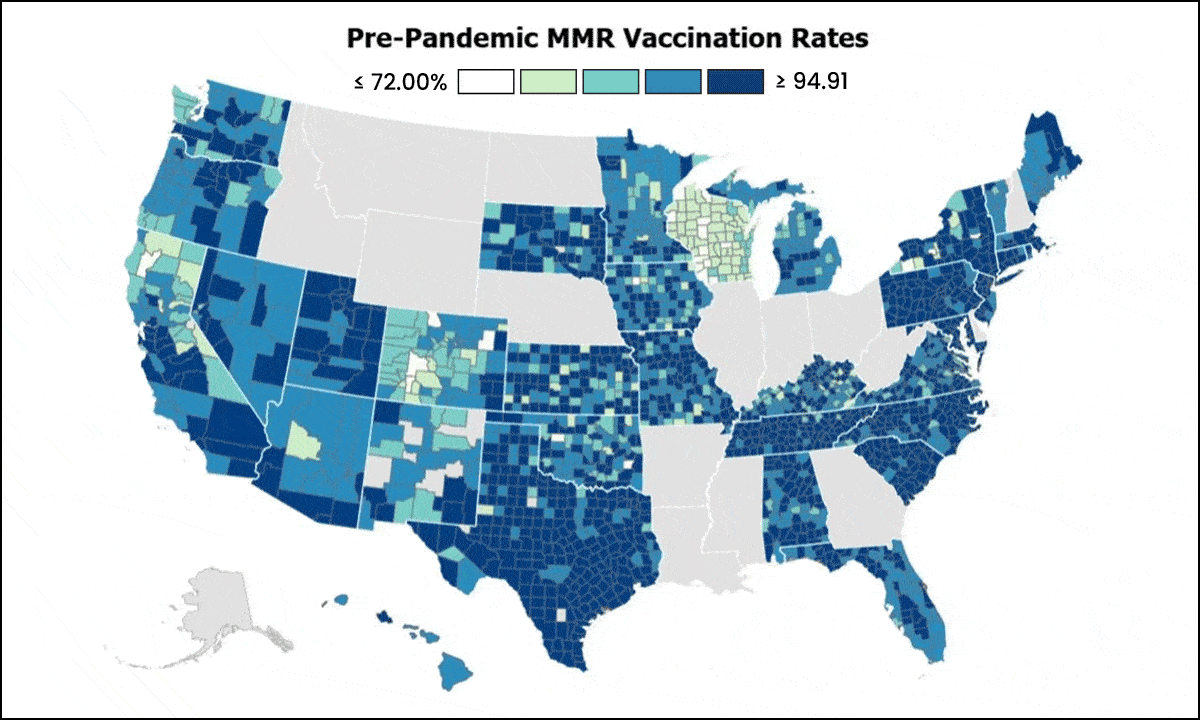New Research: Childhood Vaccination Rates Drop Across 1,600 U.S. Counties
Amid deadly measles outbreak, average measles vaccine rate fell further below herd immunity mark in 33 states, according to Johns Hopkins researchers.

Get stories like this delivered straight to your inbox. Sign up for The 74 Newsletter
Correction appended June 17
Childhood vaccination rates have markedly declined across the U.S. since the start of COVID, according to new Johns Hopkins University research showing 78% of more than 2,000 counties reported drops and the average immunization rate had fallen to 91% — further below the 95% threshold needed for herd immunity
While existing Centers for Disease Control and Prevention data has historically shown broadly declining measles-mumps-rubella vaccination rates at the state and national levels, the county-level analysis published this week in JAMA is far more granular.
It provides a “better understanding of these pockets where you have more exceptionally high risk,” said senior author Lauren Gardner, the director of Johns Hopkins University’s Center for Systems Science and Engineering.

“Knowing where there are problem areas,” she added, “gives policymakers and public health professionals locations to target their limited resources to try and improve vaccination coverage and therefore minimize the potential risk of measles outbreaks.”
The country is currently experiencing a deadly measles outbreak that has infected over 1,000 people across 30 states and killed two unvaccinated children. Case numbers this year have already surpassed 2024’s total and mark the second-highest number of confirmed cases in a year since the disease was declared eradicated in the U.S. in 2000. Some 96% of reported infections have involved a person who was unvaccinated or whose status was unknown and 13% have resulted in hospitalization.
Gardner, who also led the data collection efforts behind Johns Hopkins’ COVID-19 dashboard, and her team collected county-level, two-dose MMR vaccine rates for kindergarteners from each state’s department of health website from 2017 to 2024, where available. Ultimately, they were able to analyze trends in 2,066 counties across 33 states and made all their data available to download.
While state level average rates may decline by a few percentage points, the researchers found 130 counties where they dropped by at least 10 percentage points, and in 15 of those counties, they plummeted more than 20.
Only four of the states studied — California, Connecticut, Maine and New York — reported an increase in the median county-level vaccination rate. They are currently the only four states that exclusively allow medical — and not philosophical or religious — exemptions to mandatory vaccines for school-aged children.
Gardner said she pursued the county-level data after observing growing vaccine hesitancy and misinformation. Based on her years of work in the field, she said she was “100% expecting to see [these current outbreaks].”
If vaccination rates continue to drop “measles is likely to return to endemic levels in the US,” according to the Johns Hopkins’ report — a concern other experts see as heightened by Robert F. Kennedy Jr. now heading the U.S. Department of Health & Human Services. A well-known vaccine skeptic, Kennedy initially downplayed the measles spread in late February and has been inconsistent in his support of the MMR vaccine.
Under Kennedy’s leadership, the Trump administration released the controversial “Make America Healthy Again” report on May 22, which misinterpreted studies, cited ones that don’t exist and is suspected of being generated in part by artificial intelligence. The report, which involved no pediatricians, questions the safety and importance of some childhood vaccines.
“Despite the growth of the childhood vaccine schedule,” the report reads, “there has been limited scientific inquiry into the links between vaccines and chronic disease, the impacts of vaccine injury, and conflicts of interest in the development of the vaccine schedule.”
Paul Offit, the director of the Vaccine Education Center at the Children’s Hospital of Philadelphia and a professor of pediatrics at the University of Pennsylvania Perelman School of Medicine, pushed back on these assertions.

The issue has been well studied, and there is no evidence of links between childhood vaccines and chronic diseases — including diabetes and autism — said Offit, who is also member of the Food and Drug Administration’s Vaccines and Related Biological Products Advisory Committee.
He referenced 24 studies across seven countries and three continents involving thousands of children that show they’re at no greater risk of developing autism if they receive the MMR vaccine.
Current skepticism is not isolated to the measles vaccine: The Food and Drug Administration, which falls under HHS, recently released updated guidance which no longer recommends the COVID vaccine for healthy children or pregnant women. In response, a top COVID vaccine adviser at the CDC resigned this week, according to reporting from The Washington Post.
And across the country, numerous states have introduced legislation to loosen vaccine requirements for school-aged children, opening the door for more parents to opt their kids out.
“I think this is only going to get worse,” Offit said. “I think vaccines are under attack. You have a secretary of Health and Human Services who will do everything he can during the years that he is in that position to make vaccines less available, less affordable and more feared. … So I think this is a dangerous time to be a child in the United States of America.”
Correction: In a previous version of this story, we incorrectly characterized Dr. Paul Offit’s status on the CDC’s Advisory Committee on Immunization Practices. He is a former voting member of the CDC’s advisory committee and a current member of the FDA’s vaccine advisory committee.
Get stories like these delivered straight to your inbox. Sign up for The 74 Newsletter

;)
